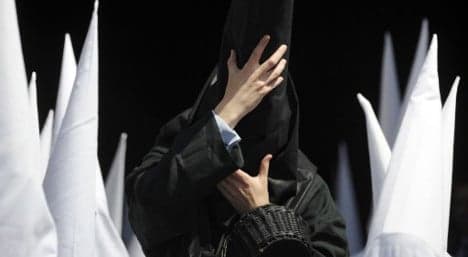Easter pardon: Thieving banker walks free

A Spanish banker jailed for stealing €30,000 ($41,000) from a client is one of 21 prisoners given a reprieve during this year's traditional Easter pardons in Spain, but opponents say the practice is an anachronism and should be stopped.
It’s a ritual which resembles the liberation of Barabbas at the expense of Jesus Christ.
Every Holy Week in Spain, around 20 prisoners are freed at the request of the cofradías, the religious brotherhoods behind most of the processions which take place across the country.
Although Spain's Justice Ministry claims the Catholic pardons are granted under the same conditions as official reprieves (impartiality, legality and for the benefit of the general public), a large part of Spanish society struggles to comprehend how these outdated trials are still carried out.
One pardon stands out above all others this year, mainly as a result of the nationwide media coverage it has received.
Francisco Segundo Domingo Vaquero, former branch director for Santander bank in the city of Valladolid, repeatedly misappropriated funds belonging to one of his customers, amounting over time to more than €30,000.
He was sentenced to two years and four months in prison, forced to reimburse the family of the then deceased bank customer the full amount he’d stolen and also pay a €10 daily fine over the course of 11 months.
Aside from those who believe Spain’s political elite have an ulterior motive for freeing a banker before his sentence is over, there are also organizations calling for the overall ban on holy pardons.
"Once again and without any law obliging them to do so, the (Spanish) government has granted the 'prerogative of mercy' to convicts, at the request of Catholic brotherhoods," Spanish NGO Secular Europe (Europa Laica) said in a statement issued on Sunday.
The group, which calls for the separation between the Church and the State, argues holy pardons go against the Constitution’s 'everyone is equal before the law' motto, as they’re only granted to repentant Catholics.
They've also called it "politically absurd" that an 18th century tradition has been accepted by every democratic government in Spain to date.
The tradition stems from a 1759 prison riot in the southern Spanish city of Malaga, when inmates refused to allow religious processions to be cancelled due to an outbreak of the Plague.
Ever since, pardoned prisoners have taken part in the religious celebrations carried out by the Catholic brotherhood that called for their liberation.
Don't miss stories about Spain, join The Local on Facebook and Twitter.
Comments
See Also
It’s a ritual which resembles the liberation of Barabbas at the expense of Jesus Christ.
Every Holy Week in Spain, around 20 prisoners are freed at the request of the cofradías, the religious brotherhoods behind most of the processions which take place across the country.
Although Spain's Justice Ministry claims the Catholic pardons are granted under the same conditions as official reprieves (impartiality, legality and for the benefit of the general public), a large part of Spanish society struggles to comprehend how these outdated trials are still carried out.
One pardon stands out above all others this year, mainly as a result of the nationwide media coverage it has received.
Francisco Segundo Domingo Vaquero, former branch director for Santander bank in the city of Valladolid, repeatedly misappropriated funds belonging to one of his customers, amounting over time to more than €30,000.
He was sentenced to two years and four months in prison, forced to reimburse the family of the then deceased bank customer the full amount he’d stolen and also pay a €10 daily fine over the course of 11 months.
Aside from those who believe Spain’s political elite have an ulterior motive for freeing a banker before his sentence is over, there are also organizations calling for the overall ban on holy pardons.
"Once again and without any law obliging them to do so, the (Spanish) government has granted the 'prerogative of mercy' to convicts, at the request of Catholic brotherhoods," Spanish NGO Secular Europe (Europa Laica) said in a statement issued on Sunday.
The group, which calls for the separation between the Church and the State, argues holy pardons go against the Constitution’s 'everyone is equal before the law' motto, as they’re only granted to repentant Catholics.
They've also called it "politically absurd" that an 18th century tradition has been accepted by every democratic government in Spain to date.
The tradition stems from a 1759 prison riot in the southern Spanish city of Malaga, when inmates refused to allow religious processions to be cancelled due to an outbreak of the Plague.
Ever since, pardoned prisoners have taken part in the religious celebrations carried out by the Catholic brotherhood that called for their liberation.
Don't miss stories about Spain, join The Local on Facebook and Twitter.
Join the conversation in our comments section below. Share your own views and experience and if you have a question or suggestion for our journalists then email us at [email protected].
Please keep comments civil, constructive and on topic – and make sure to read our terms of use before getting involved.
Please log in here to leave a comment.